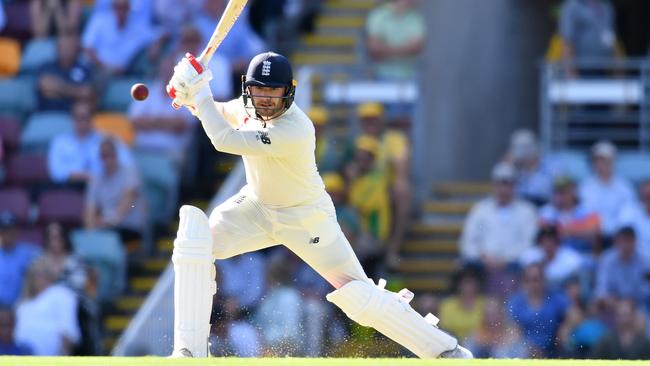Ashes first Test: Known unknowns put a name to Batty McBatface
Few England teams can have arrived at a First Test so unheralded, almost incognito.

Unknown knowns? Say hello to known unknowns.
Few England teams can have arrived at a first Test so unheralded, almost incognito, “nobodies” and “no-names” being among the more generous descriptions. As far as many Australians were concerned, the visiting top three was Alastair Cook, Subject to Selection and Batty McBatface.
With their teammates, James Vince and Mark Stoneman had played three warm-up matches on pitches where bowling at speed was as rewarding as pushing rope. It looked to some educated observers like a honeytrap, designed to spring at the Gabba, with the revelation of 22 yards of fiery hell.
But if such a memo existed, it never reached Kevin Mitchell, whose pitch, under a sun too gentle to bake it hard, mocked the Australian muzzle velocities of around 140km/h. And so the anonymous Vince and Stoneman bedded in on the crucial variable of the surface, with promising security.
Since Australia chose its squad for Brisbane, England’s objective has been correspondingly plain — to bat deep and long enough for the hosts to feel the want of a fifth bowler. Easier said than done, of course, and on the basis of their batting in the last year like planning for a bouffant having just a combover to work with.
Wispy and round-shouldered, Vince is the easiest of all England’s batsmen on the eye, and had previously the lightest impact on scoreboards — seven matches without a half century. When he reached his first yesterday by caressing Josh Hazlewood through point, he offered his partner a perfunctory head-down handshake and his coaches a modest nod — of gratitude, one imagines, for his second chance.
His reputation has been for attractive strokes and arrested developments. Against the Cricket Australia XI in Adelaide, he fell in the first over of legspin and the penultimate over of the first session aiming for cow corner. His edge eluded Tim Paine here, between accumulations of half his runs through the covers, as the Australian pace bowlers pursued lengths a tad full.
Stoneman: there can hardly have been a better name for an opening bat, reminiscent of the favourite boulder that the artist Tracey Emin married on the grounds that “it’s not going anywhere”. He has been left in possession as Cook’s partner as much by the form of others, Haseeb Hameed and Keaton Jennings losing their respective technical ways, as his own.
His method, however, is more robust and reassuring, without extensive preliminaries or obtrusive mannerisms, recalling another Surrey left-hander, John Edrich, who made a hundred first-class hundreds with a backlift that never rose above the height of the stumps.
Early on, Stoneman leaned out to slash wide past gully, at a distance where Edrich would have abjured a stroke until he was 150 — his county reputation is actually for liking the kiss of bat on ball.
Otherwise he played the ball under the eyes, soaking up the bowling and the circumstances patiently, dropping his wrists beneath bouncers, standing sentry over the off-side channel. When Pat Cummins angled the ball back to bowl him in the last over before tea, it was against the run of play — actually the Australian’s maiden first-class wicket at the Gabba.
To that point it was almost as though the home side had given it all at their strenuous press conferences over the preceding days. For all the talk of 2013-14, it is in cricket terms dog years ago: at the toss stood Michael Clarke and Kevin Pietersen, turned by the intervening four years into grizzled veterans.
Australian dominance in Brisbane was reinforced by the presence of referee Richie Richardson, a young dasher the last time a visiting team won a Test here, although that was another Gabba, and a rather different square, ago. The coin falling Joe Root’s way warded off the various Gabba omens. The sight of the ball making parabolae into Paine’s gloves and the fall of a soothing rain then prolonged the hospitality.
Taking the pitch out of the equation offered a way forward: it was no coincidence that the day’s fastest delivery, from Mitchell Starc, was a full toss. The pitch was likewise an irrelevance when Nathan Lyon swooped and nonchalantly detonated the non-striker’s stumps ahead of Vince’s sliding bat.
Vince’s intentions were pure — rotation, prudence, initiative, impetus. His technique was not bad, stunning the ball into the off side and setting off with the momentum of his forward press. But Lyon was not at cover to rest. He is deceptively quick and agile, and these days confident in all his capabilities. Vince was shortly wishing to turn back time.
With this, the Englishmen went into their shells — withdrew into them like they were nautiluses, in fact, as the late-afternoon shadow of the stands engulfed the field. Root was subdued, Dawid Malan almost somnolent. With a loop and a smile, Lyon found bounce and deviation.
Despite best efforts, none of the top order had taken up coach Trevor Bayliss’s injunction to turn 60s into 160s. It was a scenario for which the tourists would probably have settled amid the morning’s unknowns, but not quite as encouraging on the basis of what had become known.



To join the conversation, please log in. Don't have an account? Register
Join the conversation, you are commenting as Logout